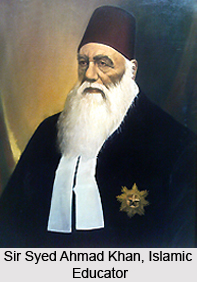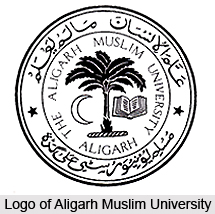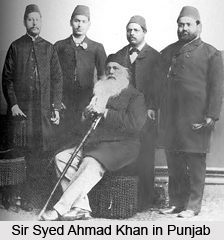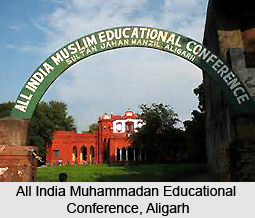 Sir Syed Ahmed Khan was an Indian educator and politician who pioneered modern education for the Muslim community in India by founding the Muhammedan Anglo-Oriental College, which later developed into the Aligarh Muslim University. His work gave rise to a new generation of Muslim intellectuals and politicians who composed the Aligarh Movement to secure the political future of Muslims in India. Sir Syed Ahmad was granted the title of `Javad-ud-Daulah` by Bahadur Shah Zafar, the last Mughal emperor in the year 1842 and this title was given to Syed Hadi, the grandfather of Sir Syed Ahmad during the middle portion of 18th century by Shah Alam I. Syed Ahmad?s contribution the Urdu language as the mother tongue of Indian Muslims is praiseworthy, apart from his motivation towards the growth of a new generation of Muslim politicians. Although hailed as a great Muslim leader and social reformer, Sir Syed remains the subject of controversy for his views on Hindu-Muslim issues.
Sir Syed Ahmed Khan was an Indian educator and politician who pioneered modern education for the Muslim community in India by founding the Muhammedan Anglo-Oriental College, which later developed into the Aligarh Muslim University. His work gave rise to a new generation of Muslim intellectuals and politicians who composed the Aligarh Movement to secure the political future of Muslims in India. Sir Syed Ahmad was granted the title of `Javad-ud-Daulah` by Bahadur Shah Zafar, the last Mughal emperor in the year 1842 and this title was given to Syed Hadi, the grandfather of Sir Syed Ahmad during the middle portion of 18th century by Shah Alam I. Syed Ahmad?s contribution the Urdu language as the mother tongue of Indian Muslims is praiseworthy, apart from his motivation towards the growth of a new generation of Muslim politicians. Although hailed as a great Muslim leader and social reformer, Sir Syed remains the subject of controversy for his views on Hindu-Muslim issues.
He was one of the most influential Muslim politicians of his time. Sir Syed was suspicious of the Indian independence movement and called upon Muslims to loyally serve the British Raj. He denounced nationalist organisations such as the Indian National Congress, instead forming organisations to promote Muslim unity and pro-British attitudes and activities. Sir Syed promoted the adoption of Urdu as the language of all Indian Muslims, and mentored a rising generation of Muslim politicians and intellectuals.
Early Life of Sir Syed Ahmad Khan
Born as a Mughal on 17th October, 1817 in Delhi, Sir Syed earned a reputation as a distinguished scholar while working as a jurist for the British East India Company. Personally affected by the turmoil of the Revolt of 1857, he wrote the booklet ?Asbab-e-Bhaghawath-e-Hind? (The Causes of the Indian Mutiny). Believing that the future of Muslims was threatened by their orthodox nature and outlook, Sir Syed began promoting western-style scientific education by founding modern schools and journals and organising Muslim intellectuals. Inspired by the functioning of British colleges, Sir Syed founded the Muhammedan Anglo-Oriental College in 1875 with the aim of promoting social and economic development of Indian Muslims. A female teacher had imparted lessons in Quran to the young Syed Ahmad Khan, particularly in reading and writing in Urdu. Ahmad Khan had also imbibed knowledge in the fields of Arabic, Persian languages and religious subjects. He was also taught Islamic jurisprudence, astronomy, Mathematics, swimming, wrestling and other kinds of sports. Besides, he took an active interest in the various cultural activities which took place in the Mughal court.
 Career of Sayed Ahmed Khan
Career of Sayed Ahmed Khan
Career of Sayed Ahmed Khan began with developing a strong passion for education around 1850`s. While pursuing studies of different subjects including European jurisprudence, Sir Syed began to realise the advantages of western-style education, which was being offered at newly-established colleges across India. Despite being a devoted Muslim, Sir Syed criticised the influence of traditional dogma and religious orthodoxy, which had made most Indian Muslims suspicious of British influences. Sir Syed began feeling increasingly concerned for the future of Muslim communities. A scion of Mughal nobility, Sir Syed had been reared in the finest traditions of Muslim elite culture and was aware of the steady decline of Muslim political power across India. The Mohammedan Anglo-Oriental College was founded by Syed Ahmad Khan and it was later renamed as Aligarh Muslim University. When he learnt that Mughal imperial power was on the blink of immediate decline, he associated himself with the civil service of the British East India Company. He was appointed as ?serestadar? in the law courts of Agra who was assigned the task of supervising court affairs and was soon promoted to the rank of ?munshi?. He was appointed to a great rank in a Muradabad court in 1858.
Political Career of Sayed Ahmed Khan
Sir Syed Ahmed was nominated to the Viceroy?s Legislative Council in 1878, and thus began the political career of Syed Ahmed Khan. He founded the Muhammadan Association to promote political co-operation amongst Indian Muslims from different parts of the country. He organised the All India Muhammadan Educational Conference in Aligarh, which promoted his vision of modern education and political unity for Muslims. His works made him the most prominent Muslim politician in 19th century India, often influencing the attitude of Muslims on various national issues. He supported the efforts of Indian political leaders Surendranath Banerjee and Dadabhai Naoroji to obtain representation for Indians in the government and civil services. He founded the Muhammadan Civil Service Fund Association to encourage and support the entry of Muslim graduates into the Indian Civil Service.
However, Sir Syed`s political views were shaped by a strong aversion to the emerging nationalist movement, which was composed largely of Hindus. Sir Syed opposed the Indian National Congress on the grounds that it was a Hindu-majority organisation, calling on Muslims to stay away from it. While fearful of the loss of Muslim political power owing to the community`s backwardness, Sir Syed was also averse to the prospect of democratic self-government, which would give control of government to the Hindu-majority population.
Scholarly Work of Sir Syed Ahmed Khan
 While continuing to work as a jurist, Sir Syed began focusing on writing on various subjects, mainly in Urdu. Scholarly Work of Sir Syed Ahmed Khan began when he published a few treatises in Urdu language on religious subjects in 1842. `A`thar-as-sanadid` or `Great Monuments` was a book which was published by Ahmad Khan. In 1842 other works of him were also published including `Tuhfa-i-Hasa`, `Jila-ul-Qulub bi Zikr-il Mahbub` and others. He generally wrote on religious and cultural themes. He also penned a commentary on the Bible- the first by a Muslim - in which he argued that Islam was the closest religion to Christianity, with a common lineage from Abrahamic religions.
While continuing to work as a jurist, Sir Syed began focusing on writing on various subjects, mainly in Urdu. Scholarly Work of Sir Syed Ahmed Khan began when he published a few treatises in Urdu language on religious subjects in 1842. `A`thar-as-sanadid` or `Great Monuments` was a book which was published by Ahmad Khan. In 1842 other works of him were also published including `Tuhfa-i-Hasa`, `Jila-ul-Qulub bi Zikr-il Mahbub` and others. He generally wrote on religious and cultural themes. He also penned a commentary on the Bible- the first by a Muslim - in which he argued that Islam was the closest religion to Christianity, with a common lineage from Abrahamic religions.
Syed Ahmed Khan`s Contribution to Education
The animosity between the British and Muslims before and after the rebellion of 1857 threatened to marginalise Muslim communities across India for many generations. Sir Syed intensified his work to promote co-operation with British authorities, promoting loyalty to the Empire amongst Indian Muslims. Committed to working for the upliftment of Muslims, Syed Ahmed Khan`s Contribution to Education led to him founding the modern `madrassa` in Muradabad in 1859; this was one of the first religious schools to impart scientific education. Sir Syed also worked on social causes, helping to organise relief for the famine-struck people of the Northwest Frontier Province in 1860. He established another modern school in Ghazipur in 1863.
Upon his transfer to Aligarh in 1864, Sir Syed began working wholeheartedly as an educator. Sir Syed felt that the socio-economic future of Muslims was threatened by their orthodox aversions to modern science and technology He published many writings promoting liberal, rational interpretations of Islamic scriptures. However, his view of Islam was rejected by Muslim clergy as contrary to traditional views on issues like `jihad`, polygamy and animal slaughtering. Clerics condemned him harshly as a `kaffir`. Due to pressure from religious Muslims, Sir Syed avoided discussing religious subjects in his writings, focusing instead on promoting education.
Advocacy of Urdu Language by Syed Ahmed Khan
The success of the Hindi movement led to advocacy of urdu language by syed ahmed khan, as the symbol of Muslim heritage and as the language of all Indian Muslims. His educational and political work grew increasingly centred around and exclusively for Muslim interests. He also sought to persuade the British to give Urdu extensive official use and patronage. Sir Syed is widely criticised for making the use of Urdu a political issue that served as a wedge between Muslims and Hindus, who saw Sir Syed`s advocacy as an effort to re-establish Muslim leadership. To Muslims in northern and western India, Urdu had become an integral part of political and cultural identity. However, the division over the use of Hindi or Urdu further provoked communal conflict between Muslims and Hindus in India. Acquainted with high-ranking British officials, Sir Syed obtained close knowledge about British colonial politics during his service at the courts.
 At the outbreak of the Indian rebellion, on May 10, 1857, Sir Syed was serving as the chief assessment officer at the court in Bijnor. Northern India became the scene of the most intense fighting. The conflict had left large numbers of civilians dead. Erstwhile centres of Muslim power such as Delhi, Agra, Lucknow and Kanpur were severely affected. Sir Syed was personally affected by the violence and the ending of the Mughal dynasty amongst many other long-standing kingdoms. Sir Syed and many other Muslims took this as a defeat of Muslim society. He lost several close relatives who died in the violence. Although he succeeded in rescuing his mother from the turmoil, she died in Meerut, owing to the privations she had experienced.
At the outbreak of the Indian rebellion, on May 10, 1857, Sir Syed was serving as the chief assessment officer at the court in Bijnor. Northern India became the scene of the most intense fighting. The conflict had left large numbers of civilians dead. Erstwhile centres of Muslim power such as Delhi, Agra, Lucknow and Kanpur were severely affected. Sir Syed was personally affected by the violence and the ending of the Mughal dynasty amongst many other long-standing kingdoms. Sir Syed and many other Muslims took this as a defeat of Muslim society. He lost several close relatives who died in the violence. Although he succeeded in rescuing his mother from the turmoil, she died in Meerut, owing to the privations she had experienced.
Sir Syed blamed the British East India Company for its aggressive expansion as well as the ignorance of British politicians regarding Indian culture. However, he gained respect for British power, which he felt would dominate India for a long period of time.
Legacy of Syed Ahmed Khan
During his lifetime and in contemporary times, Sir Syed was criticised for encouraging communal divisions between Hindus and Muslims. But the legacy of Syed Ahmed Khan is immense as he is identified by historians as one of the earliest advocates of the `The Two Nation Theory`- that Hindus and Muslims were distinct and incompatible nations. Historians argue that Sir Syed was emotionally unable to accept the prospect that an independent India`s Hindu-majority would come to rule Muslims, who had been the erstwhile colonial rulers.






